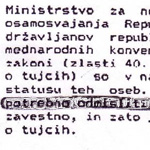 (608kB)
(608kB)The then Minister of the Interior, Igor Bavčar, addressed a letter regarding the open questions on the implementation of the Aliens Act to the government. At the beginning of the letter he stressed that the citizens of other republics of former Yugoslavia had an opportunity to arrange their status based on their free will. According to the estimations of the Ministry, there were 40,000 people, that “by the force of the law or based on the negative decision regarding the citizenship” became foreigners and were arranging their residence status in Slovenia. It is evident from the letter that the Ministry received 800 applications for permanent residence permit by 1 June 1992, while a much greater “problem” was the temporary residence permit, since only the City Secretariat of the Interior of Ljubljana issued more than 5000 temporary residence permits until that date.
Furthermore, the Minister pointed out a special problem of two legal positions that have been formed regarding the permanent residence applications. According to the first position people who resided permanently in Slovenia before the independence should be acknowledged their acquired rights and their legal status of permanent residents should be maintained; according to the second position, the provision of the Aliens Act should be strictly enforced, by which the condition of a three-year residence, based on the temporary residence permit should be fulfilled for the permanent residence permit. He also warned the government that, if taking the first position, they will have to recognize to these people also their existential rights, such as social welfare. The Minister warned the government about the fact that these people have families in Slovenia and are therefore also existentially tied to this country, which, obviously, did not convince him, as he finally suggested to the government to take the second legal position and “to ignore the acquired rights”.
From the letter it is evident that some employees at the Ministry were aware of the consequences that the erasure as deprivation of status would have for the victims, that also economic reasons (social welfare!) played a role in decision making, that the government was aware of the erasure and was familiar with it, and that the representatives of the authorities consciously ignored the acquired rights of the individuals who until then lived on the territory of Slovenia as full-fledged citizens.





